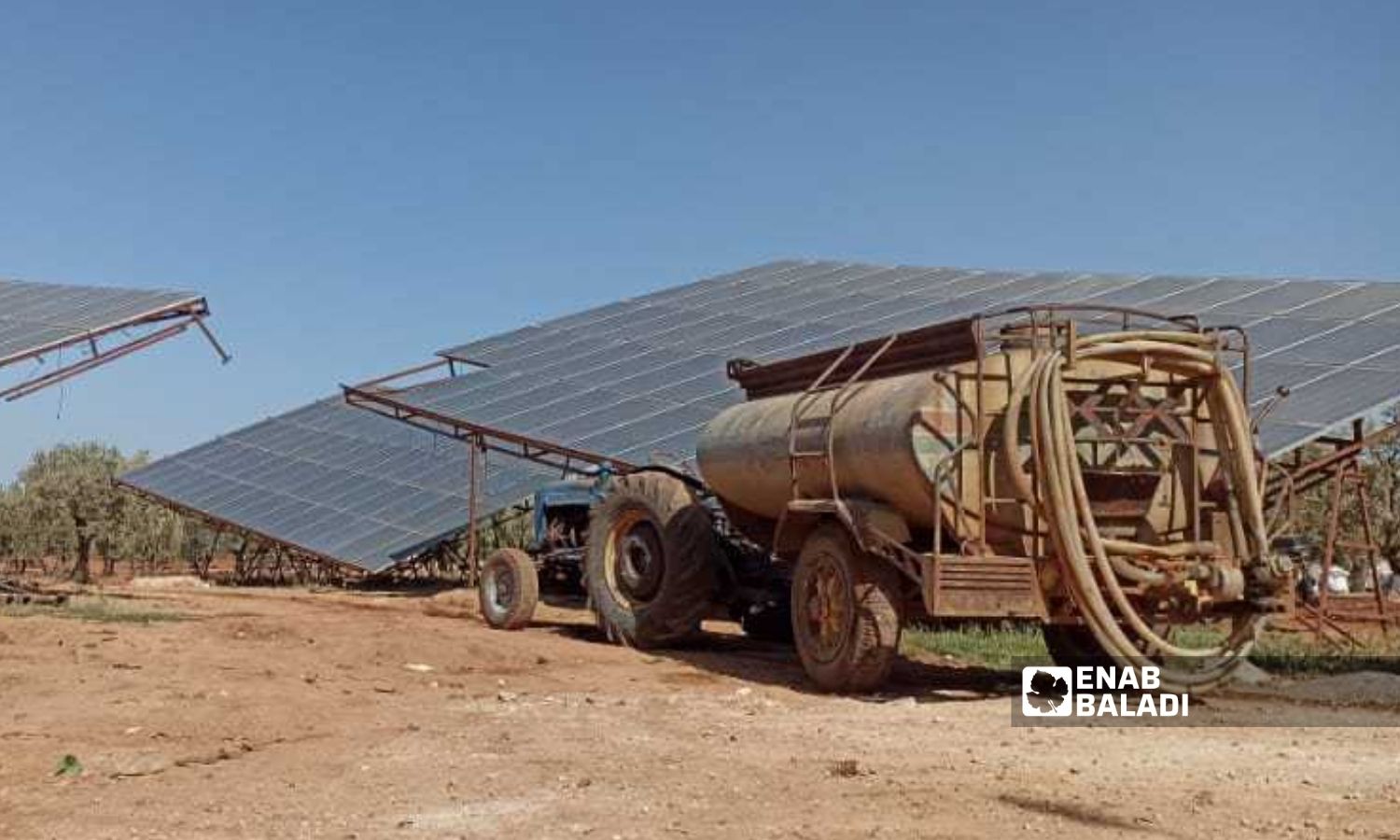



Enab Baladi – Iyad Abdul Jawad
Many residents of northwestern Syria resort to securing their needs for drinking water and water for daily use and irrigation by randomly digging surface and artesian wells, which has become a future threat to underground water resources.
Without following the standards of water regulation in many Idlib towns and villages, the drilling of wells increased, despite the presence of a de-facto government represented by the “Salvation” that manages the area in terms of service and warns of its danger.
The phenomenon of digging old and new wells has escalated with the increase in the population of the northern Syrian regions and the increase in their needs, especially after successive internal waves of displacement.
The Syrian Response Coordination Group (SRCG) counted the population of the opposition-controlled areas of northern Syria at more than 4.3 million, more than half of whom are internally displaced and forcibly displaced.
The agricultural engineer, Anas Abu Tarboush, told Enab Baladi through an electronic correspondence that drilling wells, whether surface or deep, to obtain water for multiple uses has become a noticeable phenomenon in northern Syria.
Abu Tarboush attributed the reasons for digging wells to the expansion of the cultivated lands and the exploitation of lands that were previously unavailable for agriculture now, as a result of the narrowness of agricultural spaces with the overcrowding of the population.
Pumping water for the population within the displacement camps, especially in the border area between Syria and Turkey, plays a role in increasing the drilling of wells, according to Abu Tarboush.
The random drilling of wells results in several problems, foremost of which is the threat of drought in the region and the depletion of groundwater due to the close distance between the dug wells, the lack of rain, and the varying rates of rainfall from one region to another, as well as the exposure of agriculture to similar problems in the near future.
The phenomenon of the spread of wells, whether surface or deep, was accompanied by fragility in security measures with poor financial capabilities of the residents, which made them a danger to civilians, especially children or workers, while digging them.
Deaths and injuries are frequent as a result of falling into wells in northern Syria due to the spread of uncovered ones, the absence of warning signs, and the irregularity of the process of digging such wells or backfilling of dry wells.
Local medical authorities also recorded the deaths of workers while drilling wells as a result of the absence of oxygen or the presence of fumes from sulfur water.
Drilling wells requires a high cost, especially the artesian with great depths, which is associated with the watering and irrigation of crops, which forces some residents to search for a low cost and, consequently, a lack of quality and safety standards.
Abu Mohammad, of Harbanoush town in the northern countryside of Idlib, told Enab Baladi that he dug an artesian well on his agricultural land in 15 days, reaching a depth of 370 meters where he paid 2,000 US dollars as a drilling cost.
The farmer completed the equipment needed to construct the well, including well casings, which consist of iron pipes, a plunger, an electric generator, and cables, at the cost of 10,000 US dollars, and a diesel engine at the cost of 12,000 US dollars. Such a cost is considered very high for farmers, given the deteriorating economic situation in the northern regions.
The Syrian Salvation Government (SSG) operating in Idlib issued several laws and took many measures to limit the random drilling of wells and organize drilling operations according to specific criteria, but they were ineffective.
In November 2020, the SSG prevented the drilling of wells in Idlib governorate without obtaining a certified drilling permit issued by the general directorate of water resources, noting that any violation of the decision would subject its owner to “legal and legitimate” accountability and canceling the permit.
Eng. Mohammad Neama Amhan, director of water control in the Salvation Government, told Enab Baladi via email that the general directorate of water resources in the agriculture ministry grants licenses to dig wells for various purposes, and it is the only body that grants these licenses, based on the Water Regulation Law No. 67 issued in 2022.
Amhan pointed out that the directorate operates in accordance with the water regulation law, as well as the regulations in force, as a central water control committee has been formed and has offices in the rest of the regions to follow up on violations and take legal measures that start with a written warning, up to penalties and police warrants.
In March 2021, the SSG’s agriculture ministry provided interest-free loans to farmers who own licensed private wells to equip their wells with solar energy systems and a drip irrigation network.
if you think the article contain wrong information or you have additional details Send Correction